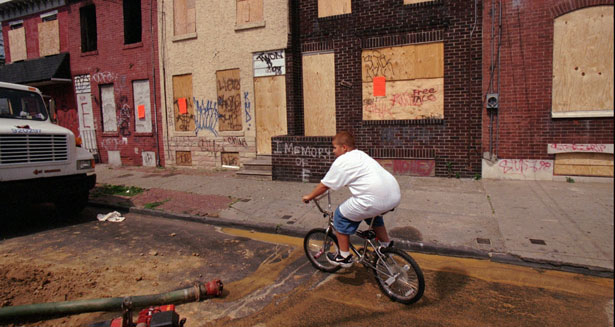
(Creative Commons)
The latest Census Bureau figures on poverty in America, combined with the data on inequality released a week earlier, confirm a shocking new reality. While a sliver of top earners are doing better than they ever have before, for tens of millions of Americans, insecurity—and, for a distressing number, destitution—is the new norm.
The current Population Survey data show that 15 percent of Americans, roughly 46.5 million people, live at or below the government-defined poverty line—which, as most who work with the hungry, the homeless, the uninsured, and the underpaid or unemployed know, is itself an inadequate measure of poverty. By more reasonable measures, poverty in this country is even more pervasive.
The headline one can take away from this is that three years into the recovery from the collapse of 2008, poverty numbers haven’t really gone down. Almost all the additional wealth being generated by a growing economy is going to those who already have the most. Median income has stagnated and, for young people, it is continuing to go down.
But there’s a deeper significance to the numbers: how they compare with the figures from recent decades. The percentage of people in poverty is roughly the same as in 1983, in the middle of the Reagan presidency, as well as in 1993, at the end of twelve years of Reagan/Bush trickle-down economics. A far higher portion of the population lives in poverty than was the case in the mid-1970s, after a decade of investment stemming from Lyndon Johnson’s War on Poverty; and far more live in poverty today than did at the end of Bill Clinton’s eight years in office—years in which the earned-income tax credit was expanded, unemployment was kept to near-historic lows, and poverty rates fell significantly.
That our poverty numbers have risen to such a high level exposes the fact that as a society, we are choosing to ignore the needs of tens of millions of Americans—as we have done for much of the period since the War on Poverty went out of fashion and the harsher politics of Reaganism set in. These ignored Americans include kids like the ones I interviewed in Los Angeles, forced to choose between applying to college or dropping out of school and getting dead-end jobs to support parents who had lost not only their jobs but their homes, too. They include the elderly lady I met outside Dallas, who was too poor to retire but too sick to take the bus to her work at Walmart. Her solution? She paid her neighbors gas money to drive her to a job that paid so little she routinely ate either 88-cent TV dinners or went to bed hungry. They include, too, the residents of New Orleans’s Lower Ninth Ward I met in 2011, who, six years after Hurricane Katrina, were still living in appalling conditions in a largely obliterated community.
Popular
"swipe left below to view more authors"Swipe →In New York City, as Democratic mayoral candidate Bill de Blasio has pointed out, nearly half the city’s residents are economically insecure. In Detroit, more than a third of residents live below the official poverty line. In New Orleans, two-thirds of African-American kids under the age of 5 live in poverty. And the list goes on.
With the exception of Romania, no developed country has a higher percentage of kids in poverty than America. Similarly, America also has a remarkably high percentage of people living in what is called “deep poverty,” at less than half the official poverty rate.
The Republicans claim that unless we slash what is left of the safety net by gutting food stamps (which alone keep 4 million people out of poverty and alleviate the hardship of millions more), putting stricter limits on unemployment benefits and other harsh measures, we’re doomed to go down the Greek road to ruin. In fact, this country has more than enough resources to grapple with poverty. What we’re sorely lacking is not resources but political will and empathy. In modern-day America, it has somehow become easier to bravely sally forth to do battle against assistance for the hungry, the destitute and the down-on-their-luck than to talk sensibly about the causes of mass poverty and rampant inequality.
That so many leaders of a country with a $17 trillion economy tolerate so much misery amid so much plenty—normalizing child hunger and allowing a significant part of the labor force to work full-time (if not more) and yet still be unable to pay basic bills—is one of the great scandals of our age.
That it is acceptable for billionaires to pay capital gains tax at a rate far lower than the income tax that middle-class Americans pay while 11.3 million people are unemployed and millions are bumping up against unemployment benefits limits, exposes the debased priorities of Washington. That the estate tax has been so eviscerated that only a few thousand estates per year are subject to taxes, while nearly one in four children lives in poverty, is simply hair-raising.
President Obama nodded to the scale of America’s poverty crisis in his speech commemorating the fiftieth anniversary of Martin Luther King Jr.’s March on Washington. But the occasional nod isn’t enough. This is the greatest moral challenge facing America’s leaders. It calls out for concerted action, from the presidency on down.
Zoë Carpenter also takes a look at the Census figures and notes that the "spike in poverty triggered by the recession has become the status quo."


